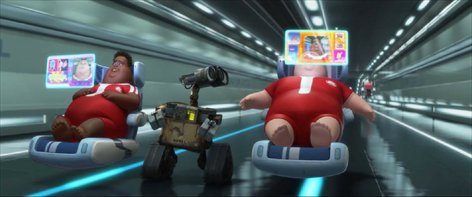Why Chinese mainland sci-fi movies never talk about AI

A scene from Wall-E Photo: IC
After Alpha Go, the Artificial Intelligence (AI) being developed by Google's DeepMind project, won four games against profestional South Korean Go player Lee Sedol recently, discussions about whether AIs would be able to surpass human beings and what would happen after they did flooded social media.
Hollywood movies have delved into the topic of AI for many years, from 2001: A Space Odyssey to the more recent Her and Ex Machina. Japanese anime has also heavily explored the connections and conflicts between AIs and human beings in films like 1995's Ghost in the Shell. However, while the Chinese mainland is on the way to becoming the biggest film market in the world, you can barely find any films about AI there. In fact the sci-fi genre as a whole remains woefully underdeveloped when it comes to the mainland film industry.
"Sci-fi is more than an opportunity to show off visual effects, it is a chance to present our attitude toward science, to talk about science's impact on human beings, the nature of humanity and the relationships between people," Cyber Knight, a Chinese sci-fi movie critic, told the Global Times.
Behind the times
During the late 1970s and early 1980s, mainland authors began focusing on sci-fi works in earnest. Tong Enzheng's Death Ray on a Coral Island was published in 1978. Telling the story of a mysterious doctor inventing a laser weapon, it was adapted into a film in 1980. Meanwhile, in 1979, the mainland's first sci-fi magazine Science Fiction World was born.
However, around 1983 authors were soon crushed by a trend that regarded sci-fi as fake science and "spiritual pollution." At this point only sci-fi films for kids were released from the late 1980s through to the 1990s, such as Electric Boy and Crazy Rabbit.
When it comes to Chinese sci-fi films, the science elements are all rather conservative and a bit behind the times. Looking at overseas sci-fi films they usually try to keep up with the latest ideas in science and technology. Star Wars in 1977 was influenced by the space technology of the time; The 6th Day in early 2000 was inspired by advances in cloning technology; the Mimic series talked about gene splicing; while the more recent Her and Ex Machina both delve into the topic of AI, an extremely popular topic right now. By comparison many Chinese sci-fi films come across as too old-fashioned.
Even those Chinese films that could be included in the sci-fi genre are not really all that sci-fi. For example, some movies feature aliens (CJ7, Impossible), but you could easily replace these aliens with fantastic genie's or magical creatures from most Chinese fantasy films and the story wouldn't really change at all. The same goes for when scientists or machines appear in movies, The Man from Macau had two robots fall in love with each other but the film would be completely the same if these robots had just been two humans.
In some cases science is brought in as a lame explanation because current mainland regulations do not allow films to portray ghosts or superstitious content. In The Ghouls, a "magical" stone that raises the dead is explained away as an alien device that causes people to hallucinate.
"We could be discussing issues such as what would happen if we rely too much on AI, like the British series Black Mirror, but instead we treat science as if it was magic or some amazing toy we've found. We do nothing to consider how these things would change a person, society or even the entire world. So in my mind, these films are just fake sci-fi," said Cyber Knight.
And science fiction does not equal visual effects or dramatic events. For instance, in one highly-rated science fiction film, The Man from Earth (2007), almost all the scenes consist of just several people sitting on a sofa and talking. But the ideas they cover reach as far as human history, religion and the world's development, which presents the spirit of science fiction: people's attitude towards science.
Things may be changing however. After Chinese author Liu Cixin won the Hugo Award last year, studios began clamoring to bring his works to the big screen. Currently adaptations have been announced for his The Three-body Problem and The Rural Teacher.
But for sci-fi fans like Cyber Knight, they are worried about these film's eventual quality.
Even though The Three-body Problem falls under hard sci-fi, fans feel that considering China's lack of experience in sci-fi it will be difficult to find a director or scriptwriter who is even interested in the science of the book, let alone ones that are capable of adapting it into film.
Raising awareness
For a very long time, sci-fi and science were only popular among a small group of people in China.
"Generally speaking, the public's scientific background is lacking. There are still many articles spreading incorrect information on social media," Cyber Knight said.
Even though movies like Interstellar were well received in China, but most of the audience for the film were people from first-tier cities and younger moviegoers in second- and third-tier cities. Cyber Knight is of the opinion that Nolan's films like Interstellar and Inception were successful in China due to their emotional beats instead of the science involved. Even if an audience may know nothing of wormhole theory, they can still be moved by a father trying to get back to his daughter.
"Additionally, our approach to science is too utilitarian. We focus too much on the uses of scientific discoveries and how much money they can make. The spirit of science should be the exploration of the unknown.
"I remembered when our taikonaut program was announced. Many people asked why the government wasn't using this money to help the poor. The public needs to be more aware of the value of science," Cyber Knight said.
Newspaper headline: Arrested developmemt